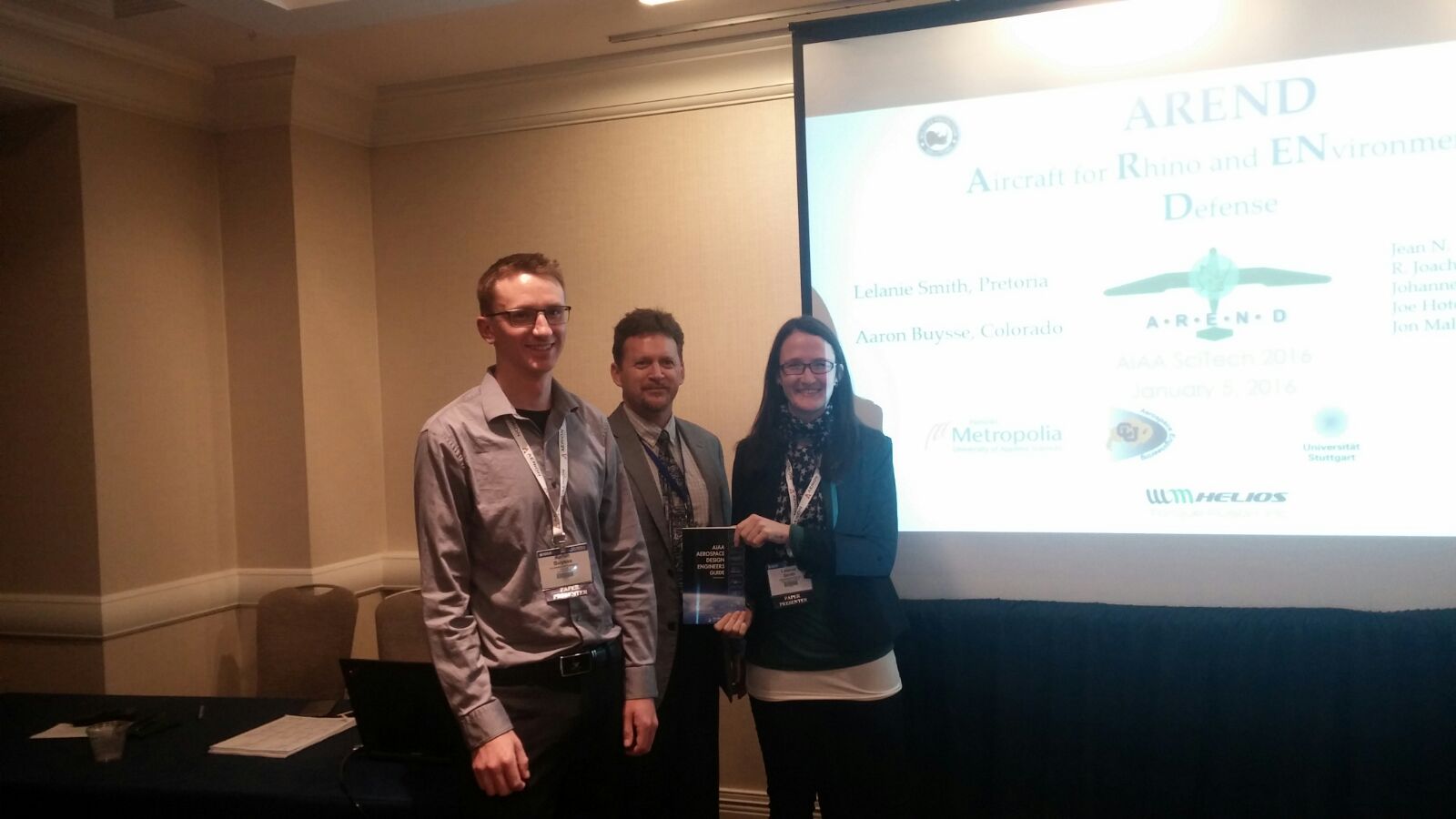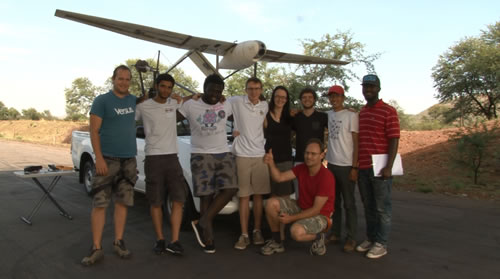Posted on January 15, 2016
The international student team AREND (Aircraft for Rhino and ENvironmental Defense) is collaborating to design, build, and fly an unmanned aerial system (UAS), a specialized sensor aircraft, in support of anti-poaching operations conducted by rangers in South Africa. During the AIAA’s Science Technology (SciTech) Conference in January 2016, the world’s largest event for aerospace research, development and technology, Team AREND presented their design for their UAS and was awarded best paper by the Design Engineering Technical Committee. Their work received praise for both the innovative design of the UAS as well as the excellent collaboration across continents and design educational challenges the team overcame

Lelanie Smith (right) (University of Pretoria, RSA) presents the aircraft design aspects of the UAV and Aaron Buysse (left) (Colorado University, USA) presents the electronic design and interface. Jon Cutshall from Southwest Research Institute (center) handing over the Design Engineering Technical Committee best paper award.
The AREND student team is composed of 4 teams: the University of Colorado Boulder, the Helsinki Metropolia University of Applied Sciences, Finland, the University of Pretoria, South Africa, and the University of Stuttgart, Germany. Team AREND is composed of aerospace, mechanical, electrical, and computer engineers, skilled in the following technical areas: structures, composite materials, fabrication, aerodynamics, thermodynamics, controls, (power) electronics, sensors and instrumentation, software, etc., University of Pretoria together with University of Stuttgart, Germany is tasked with the airframe development.
The strategy which requires an UAV to actually find the poachers is recognized as being significantly more challenging due to the large size of the Kruger National Park, the ease of successfully hiding from a search aircraft in the bush environment, the limitations of data transmission, and the limitations of human investigation of remotely sensed data. The top level requirements of this UAS were derived from these operational challenges. The large size of the park drives the design decision for a sector aircraft to patrol large areas of the park for an extended duration and quickly respond to a poaching threat. The large search radius of about 30km places restrictions on the amount of data transmitted to the ground, and motivates the need for on-board processing of the sensor data. The embedded system will be designed to process high resolution images on-board, which reserves the radio downlink for transmission of telemetry data and select images or sensor data for human verification of a poaching threat. Furthermore, the aircraft must remain undetected by poachers, and thus is designed to fly at a high altitude and generate as little noise as possible. The requirements driving camera and sensor specifications were then derived from the search altitude. The airframe is then designed around the mass and volume requirements of sensors and embedded systems, as well as the requirements for search speed and endurance.
The AREND aircraft
After the success of the first testing phase – conducting a radio controlled flight in Betty’s Bay, close to Cape Town, Dec 2014, the team tackled the final stages of integration and prepared for autonomous flight during Dec 2015. The work completed during these two test and development phases were presented at the conference. Team AREND will continue at the University of Pretoria incorporating undergraduate and post graduate students from both the Mechanical and Aeronautical Department as well as the Electrical, Electronic and Computer Engineering Department. This year the ground sensor network will be integrated as well as some further improvements done on both the airframe and embedded systems side of the UAS.

Team AREND after a successful test flight Dec 2015. (Names of participants left to right - Adam van Renssen (pilot), Muhammed Agigi (UP), Naph Yimbo (UP), Aaron Buysse (Colorado University), Lelanie Smith (UP), Wian Snyman (UP), Ken Lin (UP), Edmilson Cau (UP), in front Joachim Huyssen (UP)).
Keep track of team AREND’s progress on facebook:
https://www.facebook.com/teamAREND or our website http://teamarend.com/
Copyright © University of Pretoria 2025. All rights reserved.
Get Social With Us
Download the UP Mobile App